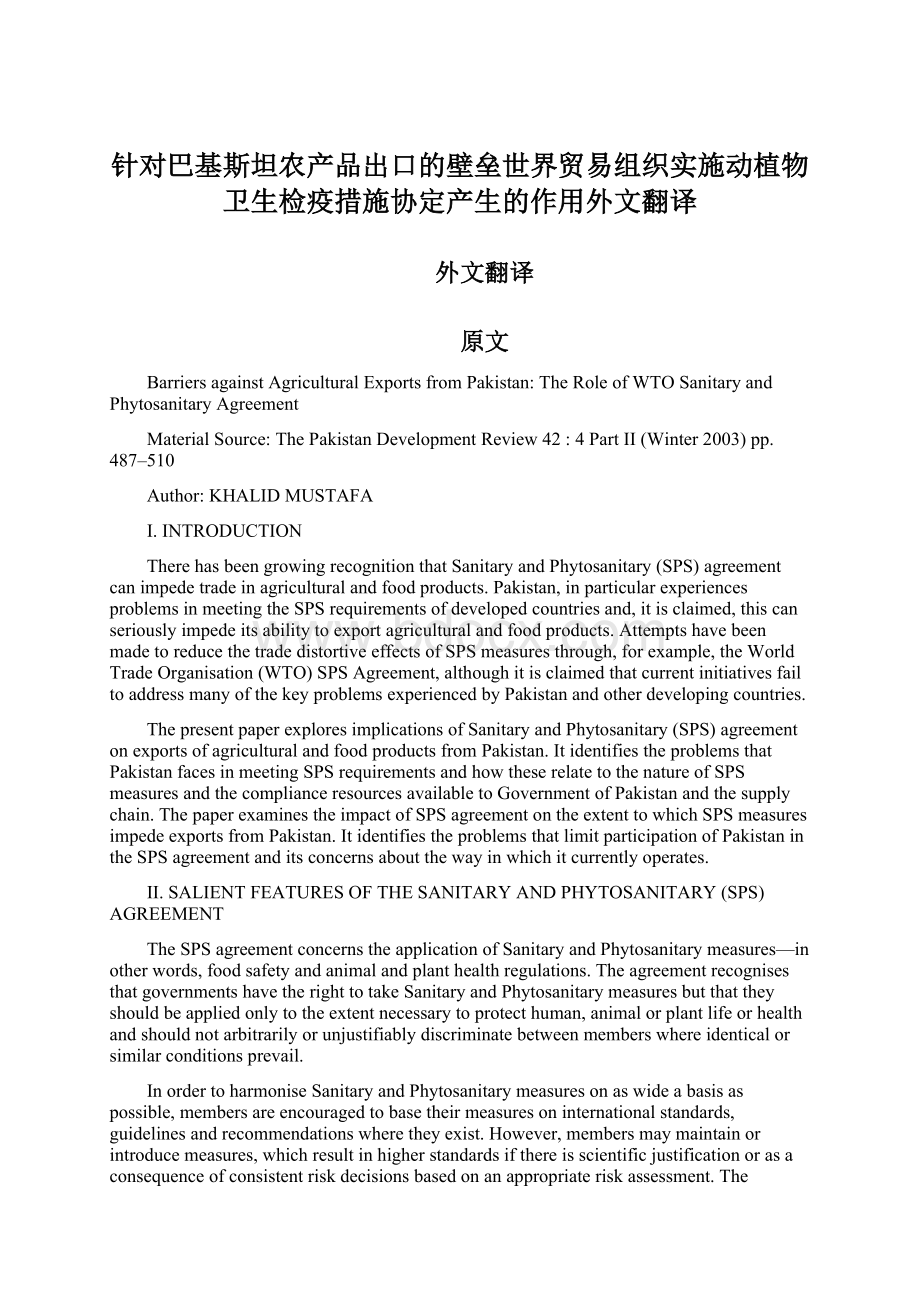针对巴基斯坦农产品出口的壁垒世界贸易组织实施动植物卫生检疫措施协定产生的作用外文翻译.docx
《针对巴基斯坦农产品出口的壁垒世界贸易组织实施动植物卫生检疫措施协定产生的作用外文翻译.docx》由会员分享,可在线阅读,更多相关《针对巴基斯坦农产品出口的壁垒世界贸易组织实施动植物卫生检疫措施协定产生的作用外文翻译.docx(8页珍藏版)》请在冰豆网上搜索。

针对巴基斯坦农产品出口的壁垒世界贸易组织实施动植物卫生检疫措施协定产生的作用外文翻译
外文翻译
原文
BarriersagainstAgriculturalExportsfromPakistan:
TheRoleofWTOSanitaryandPhytosanitaryAgreement
MaterialSource:
ThePakistanDevelopmentReview42:
4PartII(Winter2003)pp.487–510
Author:
KHALIDMUSTAFA
I.INTRODUCTION
TherehasbeengrowingrecognitionthatSanitaryandPhytosanitary(SPS)agreementcanimpedetradeinagriculturalandfoodproducts.Pakistan,inparticularexperiencesproblemsinmeetingtheSPSrequirementsofdevelopedcountriesand,itisclaimed,thiscanseriouslyimpedeitsabilitytoexportagriculturalandfoodproducts.AttemptshavebeenmadetoreducethetradedistortiveeffectsofSPSmeasuresthrough,forexample,theWorldTradeOrganisation(WTO)SPSAgreement,althoughitisclaimedthatcurrentinitiativesfailtoaddressmanyofthekeyproblemsexperiencedbyPakistanandotherdevelopingcountries.
ThepresentpaperexploresimplicationsofSanitaryandPhytosanitary(SPS)agreementonexportsofagriculturalandfoodproductsfromPakistan.ItidentifiestheproblemsthatPakistanfacesinmeetingSPSrequirementsandhowtheserelatetothenatureofSPSmeasuresandthecomplianceresourcesavailabletoGovernmentofPakistanandthesupplychain.ThepaperexaminestheimpactofSPSagreementontheextenttowhichSPSmeasuresimpedeexportsfromPakistan.ItidentifiestheproblemsthatlimitparticipationofPakistanintheSPSagreementanditsconcernsaboutthewayinwhichitcurrentlyoperates.
II.SALIENTFEATURESOFTHESANITARYANDPHYTOSANITARY(SPS)AGREEMENT
TheSPSagreementconcernstheapplicationofSanitaryandPhytosanitarymeasures—inotherwords,foodsafetyandanimalandplanthealthregulations.TheagreementrecognisesthatgovernmentshavetherighttotakeSanitaryandPhytosanitarymeasuresbutthattheyshouldbeappliedonlytotheextentnecessarytoprotecthuman,animalorplantlifeorhealthandshouldnotarbitrarilyorunjustifiablydiscriminatebetweenmemberswhereidenticalorsimilarconditionsprevail.
InordertoharmoniseSanitaryandPhytosanitarymeasuresonaswideabasisaspossible,membersareencouragedtobasetheirmeasuresoninternationalstandards,guidelinesandrecommendationswheretheyexist.However,membersmaymaintainorintroducemeasures,whichresultinhigherstandardsifthereisscientificjustificationorasaconsequenceofconsistentriskdecisionsbasedonanappropriateriskassessment.TheAgreementspellsoutproceduresandcriteriafortheassessmentofriskandthedeterminationofappropriatelevelsofSanitaryorPhytosanitaryprotection.ItisexpectedthatmemberswouldaccepttheSanitaryandPhytosanitarymeasuresofothersasequivalentiftheexportingcountrydemonstratestotheimportingcountrythatitsmeasuresachievetheimportingcountry'sappropriatelevelofhealthprotection.Theagreementincludesprovisionsoncontrol,inspectionandapprovalprocedures.
GiventhatPakistanimplementsqualitativelyorquantitativelylowerSPSstandardsthandevelopedcountries,inprincipletheSPSAgreementshouldhelptofacilitatetradefromPakistantodevelopedcountriesbyimprovingtransparency,promotingharmonisationandpreventingtheimplementationofSPSmeasuresthatcannotbejustifiedscientifically.Muchofthisisdependent,however,ontheabilityofthegovernmenttoparticipateeffectivelyintheAgreement.TheAgreementitselftriestofacilitatethisbyacknowledgingthespecialproblemsthatPakistanandmanyotherdevelopingcountriesfaceincomplyingwithSPSmeasuresandallowingforspecialanddifferentialtreatment.
III.KEYISSUESARISINGFROMTHEIMPLEMENTATIONOFSPS
NoworkhasbeenundertakentostudytheimpactofSanitaryandPhytosanitaryagreementofWTOonexportofagriculturalproductsfromPakistan.FewstudieshavehoweveraddressedtheissueofSPSmeasuresanddevelopingcountryexportsdirectly,althoughinmostcasestherelatedcostofcomplianceandimpactoftradeflowsisnotquantified.SPSmeasuresareclaimedtobeanimpedimenttoexportsof,forexample:
fish,spices,livestockproductsandhorticulturalproducts.Moretheoreticalworkhasdemonstratedthatdevelopingcountriesfinditdifficulttotradewithdevelopedcountriesduetodifferencesinqualityequipments,whichinturnreflectprevailingconsumerdemandorthenatureofgovernmentregulation(MurphyandShleifer,1997).
AnattemptwasundertakentoquantifythecostsofcompliancewithSPSmeasuresinBangladesh.ItwasfoundthatthecostofupgradingsanitaryconditionsintheBangladeshfrozenshrimpindustrytosatisfyEUandUShygienerequirementsamountedto$17.6million,mainlyincurredforupgradingplantsovertheyears1997-98.Thisgaveanaverageexpenditureperplantof$239,630.ThenaturalindustrycostrequiredtomaintainHACCPwasestimatedtobe$2.2millionperannum.Further,theGovernmentofBangladeshwasestimatedtohavespent$283,000overthisperiodandpredictedanexpenditureof$225000perannumtomaintainaHACCPmonitoringprogramme(Cato,1998).
ThedegreetowhichSPSrequirementsimpededexportsofagriculturalandfoodproductsfromAfricancountrieswasassessedthroughasurveyofCodexAlimentariuscontactpoints.Ofthecountriesthatresponded,57percentindicatedthatexportedproductswererejectedfollowingborderinspection.Themainreasonsweremicrobiologicalspoilageorcontamination.Althoughallthesecountriesinspectedfoodproductspriortoexport,mostconsideredthatfinancialconstraintslimitedtheeffectivenessoftheseproceduresandthat,inparticular,availabletestingandinspectionfacilitieswereinadequate(MutasaandNyamandi,1998).
ThecostofSPS-relatedprojectssupportedbytheWorldBankwasexaminedasanindicatoroftheresourcesrequiredforthedevelopmentofSPScontrols,bothdomesticallyandrelatedtotrade,inmanydevelopingcountries.Forexample,thecostofachievingdiseaseandpestfreestatustoenableArgentinatoexportmeat,fruitsandvegetableswasreportedtohavebeen$82.7millionovertheperiod1991-96.Similarly,thecostofupgradinghygienestandardsinslaughterhousesinHungaryover1985-91wasestimatedtobe$41.2million(FingerandSchuler,1999).
SriLankafacedSPSrelatedqualityproblemsinitsproduce,particularlyspicesintermsofpresenceofmould,highmoisturelevelandaflatoxin.Thequalityrelatedproblemsweremainlyduetoculturalpracticesandtechnologicallimitations.Theestimatedaveragevolumelosswasabout5,500metrictonsduring1999-2000andtheestimatedvalueofforeignexchangelossduetonon-compliancewasreportedtobeUS$2.9millionperyear.Thenetlossofemploymentwas2,400personseveryyearasaconsequenceofthelossofexportvolume.Further,thecostofcompliancewithqualityrequirementsintermsofprovidingtrainingto70,000traderswasaboutUS$1.954million(Hearth,2001).
AbroaderindicationoftheimpactofSPSrequirementsondevelopingcountryexportsofagriculturalandfoodproductsareprovidedbydataonrejectionsfollowingborderinspectionindevelopedcountries.Atthecurrenttime,thesedataareonlysystematicallycollectedandpubliclyavailablefortheUnitedStates.OvertheperiodJune1996toJune1997,thereweresignificantrejectionsofimportsfromAfrica,AsiaandLatinAmericaandtheCaribbeanduetomicrobiologicalcontamination,filthanddecomposition.Thecostofrejectionattheborderwasalsoconsiderable,includinglossofproductvalue,transportandotherexportcosts,andproductre-exportordestruction(FAO,1999).Thisindicatesconsiderableproblemsthatdevelopingcountrieshaveinmeetingbasicfoodhygienerequirements.
ThereisstrongneedforapplicationofSanitaryandPhytosanitarymeasuresthatincludeenforcementoflawswhichprotecthuman,animalorplantlifeandhealthbasedonscientificevidence,environmentalconsiderationsanduseofchildlabourintheproductionprocessforenhancingexportofagriculturalproductsfromPakistan.Appropriatemeasuresarerequiredforcurtailingillicittradepracticesandensuringqualityofexportsintermsofpurityoftheproduct,environmentalconsiderationsandlabourstandardsinordertocomplywithemergingrequirementsofWTOsatisfactorily.
IV.PARTICIPATIONINTHESPSAGREEMENT
Althoughthemajorityoflowandlowermiddle-incomecountriesaremembersoftheWTO,therateofmembership(62percent)wasfoundsignificantlylowerthanamongstuppermiddleorhighincomecountries(83percentand92percentrespectively).Likewisethemajorityoflowandlowermiddleincomecountrieswerereportedtobethemembersofthethreemajorinternationalstandardsorganisations,CodexAlimentarius,OIEandIPPC,althoughlessthan30percentwerereportedasmembersofWTOandallthreeoftheseorganisations.
TheSPSAgreementlaysdowncertainrequirementsthataimtoensuretransparencyintheimplementationofSPSmeasuresinmembercountries.MembersarerequiredtoestablishspecificcontactpointstofacilitatecommunicationregardingSPSmeasures.Thisinvolvesfirstly,asinglenational‘enquirypoint’,whichisresponsibleforrespondingtoqueriesfromasinglenational‘notificationauthority’,whichisresponsibleforallproceduresassociatedwithnotificationofneworamendedSPSmeasures.Itwasreportedthatonly65percentoflowandlowermiddleincomecountrieshadspecifiedan‘enquiry’pointandonly59percenthadspecifiedanational‘notificationauthority’untilJune1999.Theseproportionsincluded29leastdevelopedcountries,whichwerenotrequiredtocomplyuntil2000.
ThemostsignificantconstraintofPakistanoneffectiveparticipationintheSPSAgreementisjudgedtobe